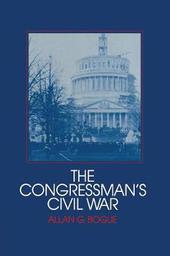
|
The Congressman's Civil War
Paperback / softback
Main Details
| Title |
The Congressman's Civil War
|
| Authors and Contributors |
By (author) Allan G. Bogue
|
| Series | Interdisciplinary Perspectives on Modern History |
|---|
| Physical Properties |
| Format:Paperback / softback | | Pages:210 | | Dimensions(mm): Height 227,Width 151 |
|
| Category/Genre | World history - c 1750 to c 1900
American civil war |
|---|
| ISBN/Barcode |
9780521357050
|
| Classifications | Dewey:328.7309 |
|---|
| Audience | | Professional & Vocational | |
|---|
| Illustrations |
Worked examples or Exercises
|
|
Publishing Details |
| Publisher |
Cambridge University Press
|
| Imprint |
Cambridge University Press
|
| Publication Date |
28 July 1989 |
| Publication Country |
United Kingdom
|
Description
In the historical literature of the American Civil War, the president, the generals, and the cabinet secretaries have won the war of words. Of the hundreds of men who served in the House of Representative during this great struggle, only a handful appear typically in general discussions of the period. Yet without a deeper understanding of the contributions of the members of Congress to the successful prosecution of the war we cannot fully appreciate the desperate nature of that conflict and its significance in the building of the nation. This book explores important aspects of the Civil War from the perspective of Capital Hill. It is an effort to reconnoiter some of the possibilities for understanding the congressmen, their relations with one another, and their interaction with President Lincoln. Designed as an exploration rather than as a full-scale history of the Civil War Congress, this book reveals a legislature in which the average length of service was very short, although a relatively small core of national public figures provide continuity. The era was one of strong ideology and fateful policy decisions, but the congressmen continued to think also as politicians. The author suggests that not one but many political agendas were at issue in Congress during the Civil War. The Republicans had significant success in achieving the goals represented by their national platform of 1860, but the necessity of developing an ad hoc wartime agenda resulted in major struggles between party leaders and between elements in Congress and in party caucuses, as well as between the legislative and executive branches. In such activity neither the president nor any particular congressional group was the clear victor, and the war ended with momentous issues still undecided. While public attention focused on such issues and great armies marched to victory or disaster, the federal lawmakers fulfilled their institutional roles to their own best advantages and thought in terms of patronage, personal power, and career advancement.
Reviews"[This book] explores a world of strong ideology and crucial party decisions in a manner that can serve as a model for future efforts by historians of the Middle Period. Bogue breaks some new ground by skillfully integrating the results of recent historical work into his conclusions. This 'view from Capitol Hill rather than from the White House' is a welcome addition to the writings of the Civil War period." The Journal of Southern History "This is a book that is much needed and long overdue...Blumin tackles this immense and important subject with remarkable confidence." The Journal of American History "[This book] explores a world of strong ideology and crucial party decisions in a manner that can serve as a model for future efforts by historians of the Middle Period. Bogue breaks some new ground by skillfully integrating the results of recent historical work into his conclusions. This 'view from Capitol Hill rather than from the White House' is a welcome addition to the writings of the Civil War period." The Journal of Southern History "This is a book that is much needed and long overdue...Blumin tackles this immense and important subject with remarkable confidence." The Journal of American History
|